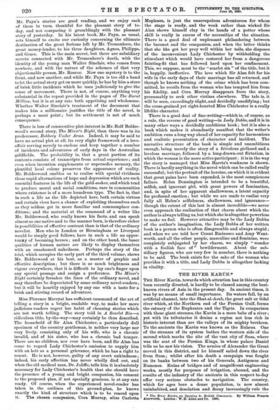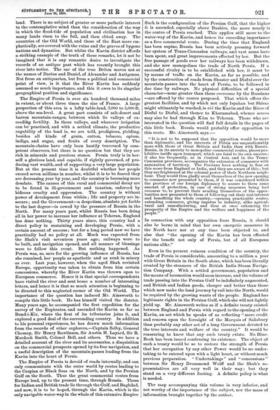THE RIVER KARUN.*
THE River Karlin, towards which attention has in this country been recently directed, is hardly to be classed among the best- known rivers of Asia in the present day. In ancient times, it was by no means of small importance. Its waters fall, by an artificial channel, into the Shat-al-Arab, the great salt or tidal river which, at the Northern end of the Persian Gulf, forms the estuary of the Euphrates and the Tigris. In comparison with these giant streams, the Karfur is a mere babe of a river ; yet with its tributaries it drains a region not less rich in historic interest than are the valleys of its mighty brethren. To the ancients the Karim was known as the Eulreus. One of the streams of its system bathes the western side of the mound which marks the site of the vast city of Susa, where was the seat of the Persian Kings, in whose palace Daniel tells us he saw his vision. The armies of Alexander the Great moved in this district, and he himself sailed down the river from Susa; whilst after his death a campaign was fought on its banks between two of his Generals, Antigonus and Eumenes. Ruins of bridges and of magnificent engineering works, mostly for purposes of irrigation, abound, and the results of the industry of the ancients in this respect to-day offer very serious obstacles to navigation. The country, which for ages bore a dense population, is now almost uninhabited, and desolation and decay increasingly rule the • Ths River Santa, an Opening to British Commerce. By William Francis Ainsworth. London : W. H. Allen and Co. 1890.
land. There is no subject of greater or more pathetic interest to the contemplative mind than the consideration of the way in which the flood-tide of population and civilisation has in many lands risen to the full, and then ebbed away. The countries of the Old World, and those of the East more em- phatically, are covered with the ruins and the graves of bygone nations and dynasties. But whilst the Karim district affords a striking example of the truth of these remarks, let it not be imagined that it is any romantic desire to investigate the records of an antique past which has recently brought this river into notice. The ear of the true Briton moves not at the names of Darius and Daniel, of Alexander and Antigonus. Not from an antiquarian, but from a political and commercial point of view, is it that the River Kazan has suddenly assumed so much importance, and this it owes to its singular geographical position and significance.
The Empire of Persia is over six hundred thousand miles in extent, or about three times the size of France. A large proportion of this area is a lofty table-land, 3,000 to 5,000 ft. above the sea-level. A great part consists of salt-desert and barren mountain-ranges, between which lie valleys of ex- ceeding fertility. In these valleys, and wherever irrigation can be practised, and with a settled climate, the productive capability of the land is, we are told, prodigious, yielding, besides all kinds of grain, cotton, tobacco, opium, indigo, and sugar, and fruits of every description. The mountain-chains have only been hastily traversed by com- petent observers, but there is no question but that they are rich in minerals and precious stones. Persia truly is in her- self a glorious land, and capable, if rightly governed, of pro- ducing vast wealth, and of supporting a very large population. But at the present time it is doubtful whether her people exceed seven millions in number, whilst it is to be feared they are decreasing year by year, and the country is becoming more desolate. The causes of this rural and commercial decay are to be found in ill-government and taxation, enforced by hideous cruelty and oppression. The country is without power of development from within ; life and property are in- secure ; and the Government—a despotism, absolute yet feeble to the last degree—is cowed by the pressure of Russia in the North. For many years past, whilst Russia has been doing all in her power to increase her influence at Teheran, England has done nothing. Thirty years since, this country had a direct policy in sustaining and developing Persia, with a certain amount of success ; but for a long period now we have practically had no policy at all. Much was expected from the Shah's visit seventeen years ago; railways were to be built, and navigation opened, and all manner of blessings were to follow this event. But nothing happened. As Persia was, so, save for the growing influence of Russia, has she remained, her people as apathetic and as sunk in misery - as ever. Last year, however, when the aged Shah revisited Europe, opportunity was taken to obtain from him certain concessions, whereby the River Karim was thrown open to European commerce. Hence it is that special correspondents have visited the river and sent home a number of interesting letters, and hence it is that so much attention is beginning to be directed to this neglected corner of the Old World. The importance of the question has induced Mr. Ainsworth to compile this little book. He has himself visited the district. Many years ago, he accompanied the first expedition for the survey of the Euphrates, and ascended the Karim as far as Bund-i-Kir, where the first of its tributaries joins it, and explored a good deal of the surrounding country. In addition to his personal experiences, he has drawn much information from the records of other explorers,—Captain Selby, General Chesney, Sir Henry Rawlinson, Sir Austin H. Layard, Sir R. Murdoch Smith, Colonel Bell, and others. Thus we have a detailed account of the river and its accessories, a disquisition on the commercial prospects opened by its free navigation, and a useful description of the mountain-passes leading from the Karin into the heart of Persia.
The Empire of Persia is devoid of roads internally, and can only communicate with the outer world by routes leading to the Caspian or Black Seas on the North, and by the Persian Gulf on the South. Thus the great commercial routes from Europe lead, up to the present time, through Russia. Those for Indian and British trade lie through the Gulf, and Baghdad, and now, it is to be hoped, through the Karlin, which is the only navigable water-way in the whole of this extensive Empire. Such is the configuration of the Persian Gulf, that the higher it is ascended, especially above Bushire, the more nearly is
the centre of Persia reached. This applies still more to the water-way of the Karlin, and hence. its exceeding importance as a free commercial route. During the time that England has been supine, Russia has been actively pressing forward her system of Trans-Caucasian railways, and vast sums have been spent, and great improvements effected by her. But the free passage of goods over her railways has been withdrawn, and she now monopolises the trade of North Persia. If a successful rivalry is to be established with her, it must be by means of traffic on the Karin, as far as possible, and by the construction of roads from Shuster and Dieu' over the mountain-passes into the heart of Persia, to be followed in due time by railways. No physical difficulties of a special character—none greater than those overcome by the Russians —are offered by the routes proposed. That which offers the greatest facilities, and by which not only Ispahan but Shiraz might ultimately be reached, is via the Karin and the River of Dizful to Dizful, and thence to Khoramabad, whence access may also be had through Kam to Teheran. Those who are interested in the question will find full details in the pages of this little book. Russia would probably offer opposition to this route. Mr. Ainsworth says :— "It is not to be supposed that the opposition would be more than diplomatic, and the interests of Persia are unquestionably more with those of Great Britain and India than with Russia. Russia, in its anxiety to monopolise commercial routes, places pro- hibitive tariffs upon transport, which are fatal to its own success ; it also too frequently, as in Central Asia and in the Trans- Caucasian provinces, accompanies the extension of commerce with annexation of territory. The Persians have nothing to fear on this score from England or India, and they are aware of this ; but they are frightened at the colossal power of their Northern neigh- bour. They would thus gladly avail themselves of the new opening to commerce now presented to them, if it was considered within the province of our foreign diplomacy to assure to them some amount of protection, in case of strong measures being had recourse to, to prevent their availing themselves of the oppor- tunities now presented to them of following out their real interest and benefiting the whole country,—opening practicable routes, extending commerce, giving impetus to industry, alike agricul- tural and manufacturing, and thus at once enhancing the prosperity of the Empire and the welfare and happiness of the people."
In connection with any opposition from Russia, it should also be borne in mind that her own energetic measures in the North have not at any time been objected to, and also that " the opening of the Karin has been effected for the benefit not only of Persia, but of all European nations alike."
Even in the present ruinous condition of the country, the trade of Persia is considerable, amounting to a million a year with Great Britain in the South alone, which has been literally created by the steamers of the British India, Steam Naviga- tion Company. With a settled government, population and the means of locomotion would soon increase, and the volume of trade passing into the Persian Gulf be indefinitely augmented, and British and Indian goods, cheaper and better than those which now make the land journey by rail into the North, would be required by the growing wants of the people. England has legitimate rights in the Persian Gulf, which she will not lightly yield up. Mr. Ainsworth writes as if a definite treaty existed between England and Persia with regard to the opening of the Karin, an act which he speaks of as reflecting " more credit and renown upon the foresight of the Marquis of Salisbury than probably any other act of a long Government devoted to the true interests and welfare of the country." It would be reassuring to know that any such treaty exists. No Blue- Book has been issued confirming its existence. The object of such a treaty would be so to restore the strength of Persia that her occupation by any other Power would be no under- taking to be entered upon with a light heart, or without mach previous preparation. " Undertakings " and " concessions " between Sir Henry Drummond Wolff and the Shah's re- presentatives are all very well in their way ; but they stand on a very different footing. A definite policy is what is needed.
The map accompanying this volume is very inferior, and not worthy of the importance of the subject, nor the mass of information brought together by the author.



















































 Previous page
Previous page